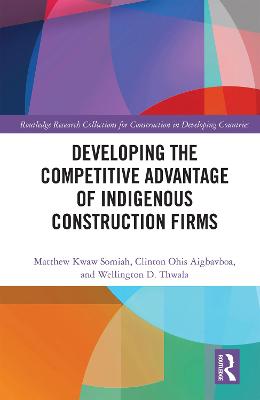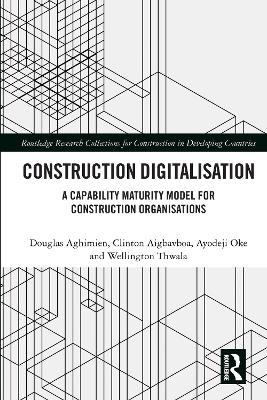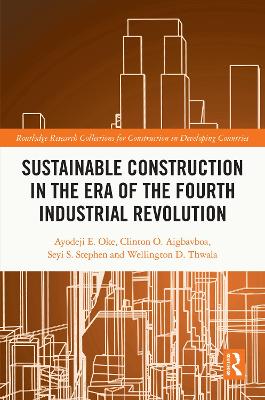Construction in Developing Countries
3 total works
Developing the Competitive Advantage of Indigenous Construction Firms
by Matthew Kwaw Somiah, Clinton Aigbavboa, and Wellington Thwala
This book takes a pragmatic approach to develop the competitive advantage of indigenous construction firms in the Global South, using Ghana as a case study. It provides readers with two major practical insights. The first focuses on the theoretical underpinning of firms’ competitive advantage and develops a competitive advantage model for indigenous construction firms. This competitive advantage conceptual framework aids in explaining the main and sub-attributes underpinning the competitive advantage of indigenous construction firms as well as providing the basis for assessing a firm’s competitiveness. Secondly, it highlights and addresses theoretical gaps in existing competitive advantage studies deemed essential for indigenous construction firms. Finally, a detailed two-stage Delphi study in the Ghanaian construction industry is presented as a case study.
The book is therefore of interest to researchers in construction management, strategic management, civil engineering, business administration, marketing, entrepreneurial and economic studies. It is an essential manual for owners and managers of construction businesses. It is also useful for government departments and non-governmental agencies seeking innovative ways to develop the capacity of indigenous firms and/or contractors to make them more responsive to competitive bidding scenarios, delivery of projects, and satisfying the needs of the industry’s stakeholders.
Construction Digitalisation
by Douglas Aghimien, Clinton Aigbavboa, Ayodeji Oke, and Wellington Thwala
This book explores construction digitalisation, particularly in developing countries. The book conceptualises a digitalisation capability maturity model that will enable construction organisations to self-assess and benchmark their digital capabilities in their quest for digital transformation.
Digitalisation offers a significant solution to the age-long problems of the construction industry. Research shows that when construction organisations transform from a traditional service delivery approach to a more digitalised approach, significant improvement in project delivery and better competitive advantage for these organisations will be attained. The attainment of these benefits is evident in developed countries where the digitalisation of construction activities continues apace. Unfortunately, the story is not the same for construction organisations in developing economies. While some organisations might be willing to be digitally transformed, most have no clue how to go about it. To this end, this book provides guidelines for construction organisations seeking to transform their entities digitally. Its content is a valuable read for construction company owners as it provides a model which they can use in the digitalisation of their activities. Also, regulatory bodies in the construction industry can adopt the capabilities identified in the book as essential prerequisites for their members. Furthermore, the book serves as excellent theoretical background reading for management researchers seeking to expand their knowledge on the digitalisation of the construction industry and other associated industries.
Sustainable Construction in the Era of the Fourth Industrial Revolution
by Ayodeji Oke, Stephen Segun, Clinton Aigbavboa, and Wellington Didibhuku Thwala
This book provides readers with an understanding of various concepts, benefits, and practices that the adoption of Fourth Industrial Revolution (4IR) technolo>gies can bring when working towards sustainable construction goals. As digitalization continues to advance rapidly, the pressures on stakeholders in the architecture, engineering, construction, and operation (AECO) industry to revamp and restructure their activities and outputs become increasingly prev>alent. This research book explains the importance of various digital tools and principles to achieve sustainable construction projects. It adopts various stand>ards and concepts to highlight how 4IR technologies could assist and accelerate construction sustainability. It is the first book to link construction management with various digital tools to enhance construction projects’ sustainability. It also provides an in-depth insight into the concept of sustainable construction 4.0 across both developing and developed countries for construction professionals, sustainability experts, researchers, educators, and other stakeholders.The book can be adopted as a research guide, framework, and reference on
sustainable construction, the concept of sustainable projects, digitalization in the construction industry, and the 4IR.


